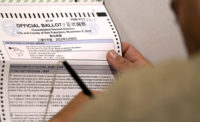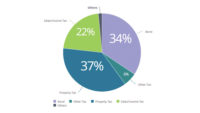Voters Show Support for Transportation Measures
Tuesday, Nov. 3, proved to be a good day at the polls for infrastructure funding, with voters in eight states endorsing a variety of ballot measures aimed at generating new revenue for transportation and related projects. Nearly three-quarters of the 37 state and local transportation-related referendums across the U.S. passed, according to the American Road & Transportation Builders Association’s Transportation Investment Advocacy Center.
Texas voters overwhelmingly approved an amendment to the state constitution that could direct as much as $2.5 billion annually to build and maintain non-tolled public roads and repay transportation-related debt. The exact amount of the allocation for each fiscal year, from 2017 to 2032, is contingent on the state surpassing a $28-billion threshold in sales- and use-tax revenue.
In addition, 35% of Texas’s annual motor-vehicle sales and rental tax collections above $5 billion will be added to the State Highway Fund for a 10-year period, beginning in 2019.
The measure also authorizes the Texas Legislature to reduce the total contribution to road projects by up to 50% in the event of an economic downturn and to extend the appropriations in 10-year increments beyond their current expiration dates.
A separate ballot proposal, also endorsed by a wide margin, allows Texas counties with populations of up to 7,500 residents to perform private road construction and maintenance, an increase from 5,000 residents currently allowed under state law.
The other statewide funding initiative was in Maine, where 72% of voters approved an $85-million bond issue for transportation projects, including $65 million for highways and bridges. The remainder will be used to enhance ports, aviation, rail and other transportation modes.
In Utah, a proposed local-option 25¢ sales-tax increase dedicated to road and transit funding met with mixed results. The measure passed in 10 of the 17 counties where it was on the ballot but failed in the two highest-population jurisdictions. Opponents criticized having 40% of the new revenue earmarked for the Utah Transit Authority, which has come under fire for paying its executives high salaries and bonuses. The slim, 2,642-vote margin of defeat in Salt Lake County encouraged supporters that the measure may yet pass there once an estimated 24,000 remaining ballots are counted and certified by Nov. 17.
At the local level, Seattle voters approved a nine-year, $930-million property-tax levy to fund improvements to streets, transit, and pedestrian and bicycling routes. The initiative, which replaces a similar, expiring $365-million levy passed in 2006, will not be applied to some of the city’s priority infrastructure projects, including updating two key bridge crossings or the $410-million reconstruction of the century-old Elliott Bay seawall.
In Harris County, Texas, which encompasses much of metropolitan Houston, voters approved a $700-million bond issue for roads and bridges as well as a separate, $64-million issue for flood-control improvements. Both issues will take place over a seven- to 10-year period, beginning next year. No specific projects have been identified for the new funding. Next door in fast-growing Montgomery County, voters passed a $280-million bond package for road improvements.





